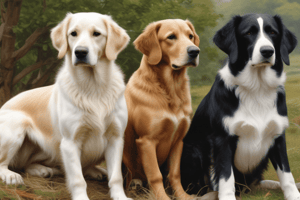Podcast
Questions and Answers
What is the primary role of a call dog in hunting?
What is the primary role of a call dog in hunting?
What is a significant part of training a call dog?
What is a significant part of training a call dog?
Which attribute is commonly sought after in breeds used as call dogs?
Which attribute is commonly sought after in breeds used as call dogs?
In what environments are call dogs typically used?
In what environments are call dogs typically used?
Signup and view all the answers
What historical significance do call dogs hold?
What historical significance do call dogs hold?
Signup and view all the answers
How do responsible breeders approach the breeding of call dogs?
How do responsible breeders approach the breeding of call dogs?
Signup and view all the answers
What factor can limit a call dog's effectiveness in the field?
What factor can limit a call dog's effectiveness in the field?
Signup and view all the answers
What aspect of a call dog's training requires careful attention to detail?
What aspect of a call dog's training requires careful attention to detail?
Signup and view all the answers
Study Notes
Definition and Context
- "Call dog" refers to a specific type of dog used in hunting, historically associated with tracking and retrieving prey.
- These dogs are bred and trained for their specialized skills, often in conjunction with other hunting methods (such as hunting with hounds).
- The role of a call dog is to locate and subsequently signal the presence of game to hunters.
Function and Training
- Call dogs are trained to respond to specific vocalizations (calls) from their handlers, alerting hunters to the location of the prey.
- Training involves conditioning the dog to associate specific sounds with the presence of game.
- This conditioning process is often rigorous and requires careful attention to detail, including repeated exposure to various cues and rewards.
- Effectiveness depends on the dog's responsiveness and training level.
- Call dogs require extensive training, typically involving a skilled handler who understands the dog's cues and behaviors.
Types and Varieties
- Specific breeds and strains of dogs are often favored in certain hunting environments due to attributes, like exceptional hearing.
- No single breed is exclusively a call dog, but specific traits are selected for throughout generations of breeding programs to enhance the desired characteristics.
- Dogs may have varying degrees of ability and responsiveness; consequently, handlers need to cater to each dog's specific strengths and limitations.
Working Environments
- Call dogs are most commonly used in environments where tracking and retrieving game are important aspects of the hunt.
- Such areas may be varied, encompassing wooded regions, open fields, and other terrain.
- Their skills are particularly valuable in situations involving locating and retrieving game that is difficult to see or track.
- Adaptability to varying environments is a vital skill for a successful call dog.
Historical Significance
- The practical application of call dogs dates back many centuries, evolving with the development of hunting techniques and styles.
- Their use demonstrates the human capacity to train animal companions for specific duties.
- Over time, the application of this hunting method has changed with the development of modern hunting technologies.
Ethical Considerations
- Responsible breeders adhere to practices that prioritize the well-being of the dogs.
- Ethical considerations are crucial in the breeding, training, and use of call dogs.
- Ensuring the animal's health, safety, and well-being is fundamental in this hunting approach.
- The use of dogs in hunting raises ongoing ethical debate, with considerations focusing on animal welfare and the conservation of prey species.
Studying That Suits You
Use AI to generate personalized quizzes and flashcards to suit your learning preferences.
Description
This quiz explores the definition, function, and training of call dogs used in hunting. Learn about the specialized skills these dogs possess and how they are conditioned to assist hunters in locating prey. Test your knowledge on the training methods and different types of call dogs.



